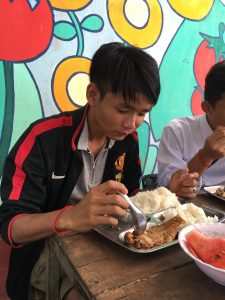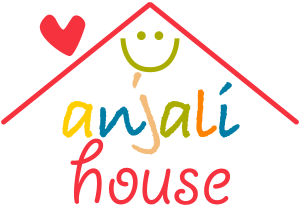<
Pheakdey is a seventeen-year-old twelfth grade student and he is currently studying at Anjali House. His mother is a homemaker and his father is a Tuk Tuk driver. With four siblings, Pheakdey’s family cannot afford to think past basic survival. As a consequence, Pheakdey could not follow basic hygiene principles. Before being enrolled at Anjali House, he had never brushed his teeth and was taking a shower only once a week, most of the time without soap and shampoo. “I didn’t know how to take care of myself before I came to Anjali House. Here, I learned how to brush my teeth and clean my body.” explains Pheakdey.Pheakdey did not suffer from any major diseases when he joined the NGO but could report he had many skin infections in the past.

Vuthy enjoying his daily nutritious lunch
Vuthy is also seventeen years old and his mother is a homemaker. His father is selling handmade bedding items in the rural areas of Siem Reap. Vuthy and his sister used to sell flowers at night in the city center of Siem Reap. After long hours of work, he would often forget to shower and never brushed his teeth. Basic survival was a challenge. During his time working in the street, he never ate breakfast. In addition, the daily food he consumed lacked the necessary nutrients to allow his body to build up his immune system and Vuthy reported that before joining Anjali House, he fell sick and tired a lot of times. “I used to be sick because of the food we ate at home. Sometimes the fish was not clean or fresh enough and I had terrible stomach aches. Today, I enjoy eating breakfast and lunch at Anjali House. I like the taste of the food and I don’t have diarrhea anymore” reports Vuthy.
Why access to basic care is crucial for learning.
“The stories of Pheakdey and Vuthy illustrate well many of the health problems affecting underprivileged Cambodian children associated with insufficient basic hygiene, poor diet and unclean drinking water. Through years of activities working with children, we could observe that not only is nutrition important for physical health but also for the mental health of children. Without vital nutrition, our students cannot maintain the adequate energy levels, concentration and enthusiasm for learning, which we know they all possess,” explains Simon Ke, Director at Anjali House.
She adds: “At Anjali House, personal hygiene is crucial. We want our students to be healthy. It is important they understand how basic hygiene impacts their health and school life.”
Both Pheakdey and Vuthy’s struggles came to end when they were enrolled at Anjali House. As with all of the students, both are now provided with two nutritious meals per day including rice, proteins and vegetables. They also bathe every day at the center and have access to basic hygiene products such as soap, shampoo, toothbrushes, and tubes of toothpaste. More importantly, all students are educated on how and when to properly use these items through basic hygiene workshops which our social worker runs several times a year. Pheakdey, Vuthy and all our students also benefit from health check-ups twice a year at a local hospital.
“I now understand the benefits of basic hygiene principles. I take a daily shower at the center and I also can wash my clothes so I can go to the government school with a clean uniform. I feel so much better about myself” adds Pheakdey.
Click on the link to learn more about the Basic Care program: https://anjalihouse.opte.io/project/basic-care/]]>
